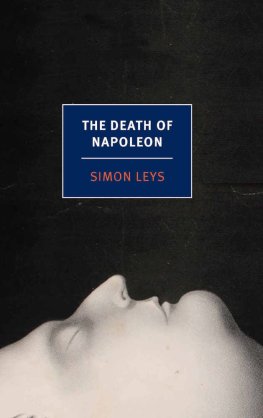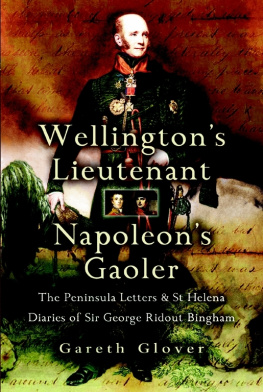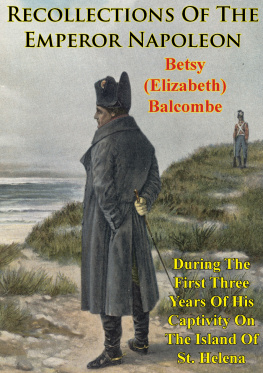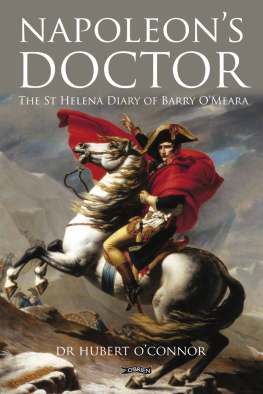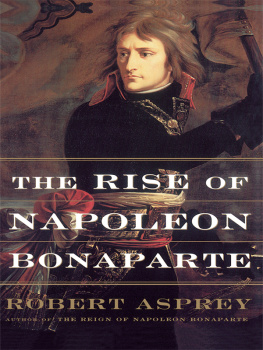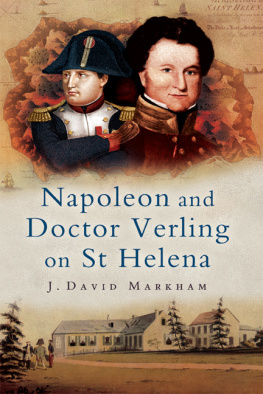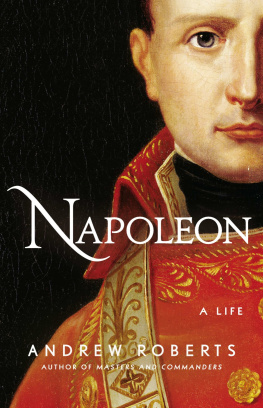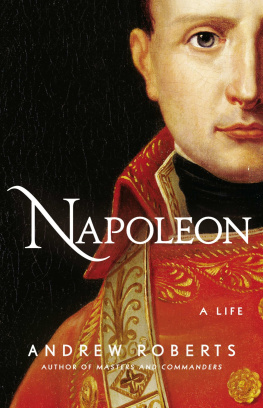The
Emperor's Shadow
ANNE WHITEHEAD is an author, historian and former TV producer-director with the ABC. She is the author of Bluestocking in Patagonia and her book Paradise Mislaid was winner of the NSW Premiers Award for Australian History.
A fascinating exploration of the life journey of Betsy Balcombe Abell from St Helena to Sydney to London. This is a well-researched and readable history of the dramatic repercussions for an English family of its proximity to Napoleon in his final years on St Helena.
Professor Ann Curthoys, University of Sydney
St Helena: an exiled emperor in the garden pavilion and in the house a pretty, flighty teenager. And therefrom spring some fascinating narratives, ending up, after a disastrous marriage to a stylish cad, in colonial New South Wales.
Marion Halligan, award-winning author
Napoleon Bonaparte
OTHER BOOKS BY ANNE WHITEHEAD
Bluestocking in Patagonia: Mary Gilmores quest for
love and utopia at the worlds end
Paradise Mislaid: In search of the Australian tribe of Paraguay
First published in Great Britain 2015 by Allen & Unwin
First published in Australia in 2015 by Allen & Unwin
Copyright Anne Whitehead, 2015
The moral right of Anne Whitehead to be identified as the author of this work has been asserted by her in accordance with the Copyright, Designs and Patents Act of 1988.
All rights reserved. No part of this book may be reproduced or transmitted in any form or by any means, electronic or mechanical, including photocopying, recording or by any information storage and retrieval system, without prior permission in writing from the publisher.
Every effort has been made to trace or contact all copyright holders. The publishers will be pleased to make good any omissions or rectify any mistakes brought to their attention at the earliest opportunity.
Allen & Unwin
c/o Atlantic Books
Ormond House
26-27 Boswell Street
London WC1N 3JZ
Phone: 020 7269 1610
Email:
Web: www.allenandunwin.com/uk
A CIP catalogue record for this book is available from the British Library.
Paperback ISBN 978 1 76011 351 3
E-Book ISBN 978 1 92526 769 3
Internal and cover design by Christabella Designs
Typeset by Midland Typesetters, Australia
To Allan, with love
who treated Napoleon with caution,
but accompanied me with Betsy and the
Balcombes every step of the way
And to Keith and Shirley Murley, with gratitude
dedicated volunteer researchers at The Briars, Mt Martha, Victoria,
for their unstinting generosity
CONTENTS
About ten years ago I was browsing along the shelves of an antiquarian bookshop, enjoying the sensual pleasure of the rich bindings, the gilded lettering, the mental travel to places called Abyssinia, Okavango, Patagonia, Smyrna, when I saw a little 1844 book, Recollections of the Emperor Napoleon on the Island of St Helena by Mrs Abell. Who was she, I wondered, and what brush with infamy had she inflated? I turned the fragile pages to discover that she had been a young girl called Betsy Balcombe when the exiled Bonaparte in 1815 was brought to the remote South Atlantic island of St Helena where she and her family lived. She had seen much of him over the course of three years. But how and why, I wondered, did this English family come to socialise with their nations great enemy? And why did he bother with them? I bought the little book and found it a charming memoir. Mrs Abell, obviously a feisty person, wrote only about those three years on St Helena and revealed nothing of her later life except a hint of some tragedy. Who was she really?
I went back to work on other projects. However, Betsys book lingered in my mind and years later I returned, to seek the larger story behind the memoir. My attempt to answer those questions has led me on a detective trail to the manuscripts collection of the British Library, sifting through the vast correspondence of Sir Hudson Lowe and Lord Bathursts private papers; on a weeks voyage on the last operational Royal Mail ship to the island of St Helena, to work in its archives and visit locations where Betsy and her family lived and Napoleon was imprisoned; to the English counties of Sussex, Kent and Devon, to their record offices, and up to bleak Dartmoor; to the highlands of Scotland; to Paris and the northern French town of Saint-Omer; to old Madras in India; and to state archives and libraries in Australia as well as the Balcombes former homes in New South Wales and Victoria. The quest involved my reading several French journals by Napoleons companions never translated into English and making surprising discoveries that have not been revealed before.
Since the Victorian era, authors have interested themselves in Betsys story, sometimes as a childrens book, sometimes confabulating it as Napoleons last romance, rarely adding anything new to her Recollections. (A revised edition of Betsys book, titled To Befriend an Emperor, was published in 2005, making this delightful story available to the general public.) A direct Balcombe descendant, the redoubtable Melbourne figure Dame Mabel Brookes, in 1960 published St Helena Story, her own account of her forebears. It was a brave attempt and told part of the story, but she lacked the research tools available to a biographer today and left many gaps. She could only say of Betsys husband that he was reputedly a handsome man-about-town, whereas his family background and career are revealed here; she wrote that Mrs Betsy Abell lived in Sydney with her family for a brief period, when it was actually ten years.
Most books about Napoleons captivity focus on the compelling prisoner, his anguish and his anger and his last great battle with the authoritarian British governor Sir Hudson Lowe. This book deals with that struggle, but from the perspective of the British family on the sidelines, who also incurred Lowes wrath because of their friendship with his charge. Through their relationship with Napoleon they inevitably also became closely acquainted with his immediate companions on the island: his devoted chamberlain and biographer Count de Las Cases; the Count and Countess Bertrand; Count de Montholon and his wife; the temperamental General Gourgaud; the loyal valet Marchand; and Napoleons physician and the Balcombes good friend, the duplicitous Irishman Dr Barry OMeara. As Bonaparte ruled over his little household, demanding imperial respect, settling their intrigues and disputes, we see the domestic Napoleon, father of an unhappy, bickering family, still mentally refighting his old battles, deploying his armies of red and black pins across a billiard table, his prodigious brain fretting over trifles: the thickness of mattresses, the scrawniness of a roast chicken, the escape of a dairy cow.
We follow Betsy and the Balcombes as they leave St Helena under a cloud because of their dangerous friendship, only to confront larger and possibly life-threatening troubles in England; to another kind of exile in France; and then to the penal colony of New South Wales, at a time of transition to a new future in which they play significant parts. Although there are many references to Betsy, her father and the family in this new life, due to the shortage of source material in their own words, I have sometimes provided an imaginative interpretation of their possible feelings and responses to their changed circumstances.



